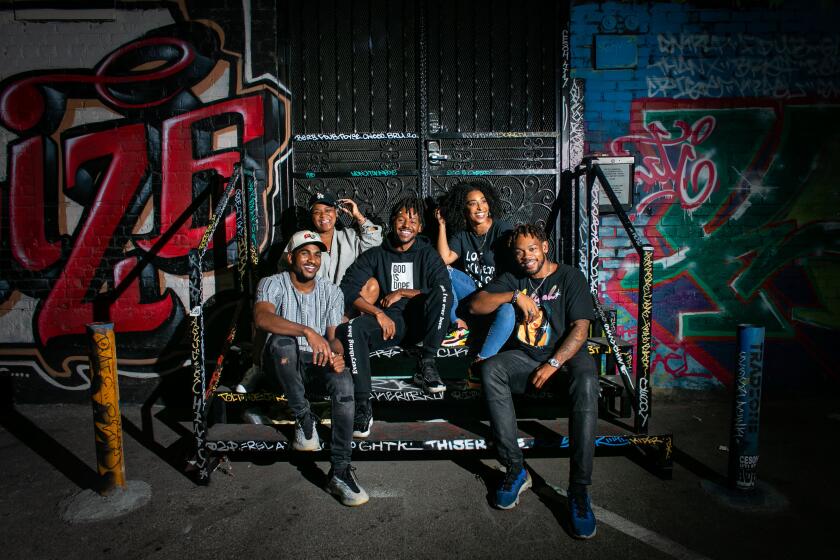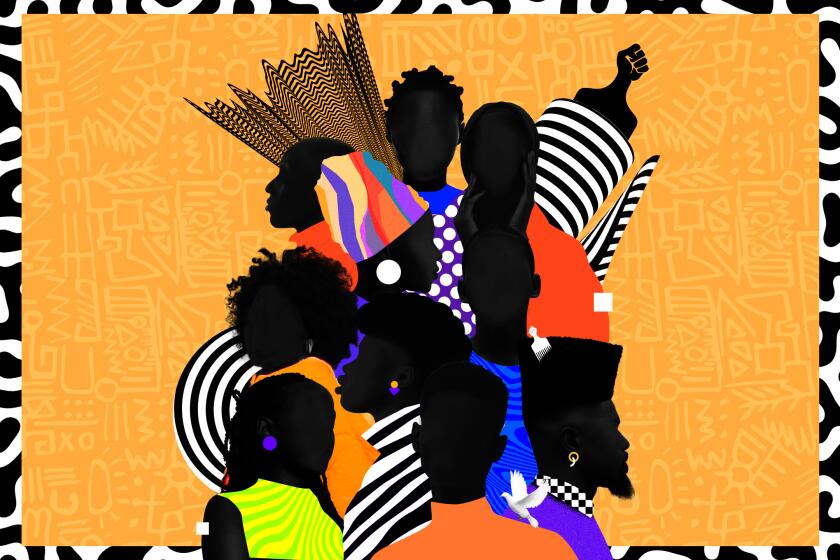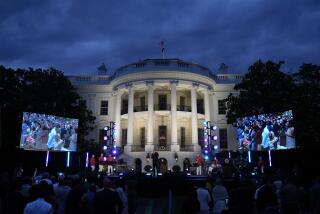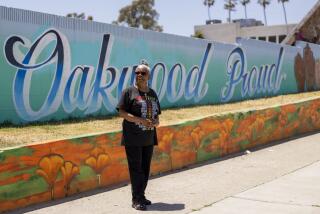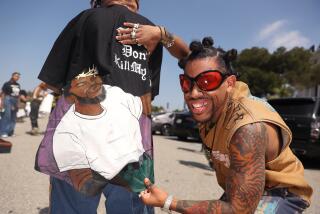Juneteenth is in its 156th year. Many Americans are just beginning to celebrate it
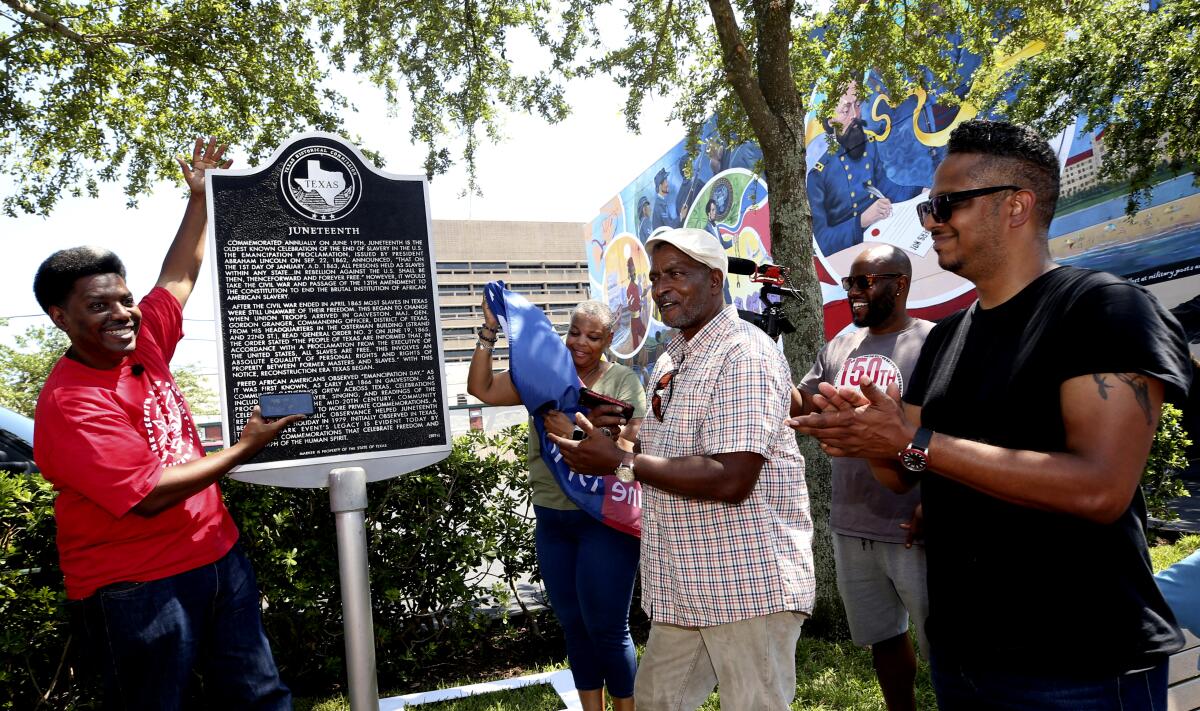
- Share via
Growing up in Philadelphia, Toyah Whitehead remembers the day in late June each year that brought crowds of Black residents to the streets and parks in celebration. There were block parties, cookouts, street performers, book sales and pan-African flags — three big horizontal stripes of red, black and green — but she never paid all that much attention to the meaning.
“I knew there were celebrations of Black people,” said Whitehead, 29, herself Black. “I had no idea it was our Independence Day.”
This year, Whitehead, who now lives in Fort Lauderdale, Fla., and runs a fashion label for Black women, is giving herself a day off of work. She’s designed shirts that say “Black is the new Black” to carry with her on the flight back home to Philadelphia, where she’ll take her 8-year-old niece to Juneteenth festivities in the city that’s long held celebrations but just recently started to mark them officially.
“A lot happened last year in our country with the protests for racial justice. It made me want to learn about Black history. I spent the pandemic year reading books, watching Netflix documentaries about Black America,” Whitehead said. “I’m a little embarrassed that I’m almost 30 and just doing my first Juneteenth. But better late than never.”
On Thursday, President Biden signed a law making Juneteenth the first new federal holiday since Martin Luther King Jr. Day in 1983. It comes 156 years after the June 19, 1865, arrival of Union troops in Galveston, Texas, when enslaved people in the region were freed more than two years after the Emancipation Proclamation was signed. (In 2014, President Obama made Cesar Chavez’s birthday, March 31, a commemorative holiday in which federal employees do not get a day off from work, as they now do for Juneteenth.)
While many Black communities across the country have long celebrated the day, others — such as Whitehead’s family — are just beginning to embrace it. In the wake of the racial justice movement after the police murder of George Floyd in Minneapolis last year, thousands of corporations, small businesses and cities across the nation have also put the day on their vacation calendars, raising its profile.
Still, according to a Gallup survey released this month, more than 60% of Americans know “nothing” or only “a little” about Juneteenth. Knowledge was highest among Black people, at 69%, and lowest among those who are white, at 31%.
It’s a lack of knowledge that was among the reasons Pearl Brunt, a 38-year-old business consultant in the suburb of Pittsford, N.Y., outside Rochester, pulled together the town’s first Juneteenth celebration last week, where poets and historians spoke to a crowd of about 100 at a park along the Erie Canal and residents took part in an exchange of books by Black authors.
“Growing up in small-town Kansas, my mom would take us to Juneteenth but to me it was like doing Christmas without really knowing about Jesus. It was a fun day to celebrate, to have cake, to go swimming,” said Brunt, who is Black and organized the event a week early to avoid conflicts with high school graduations. “But it wasn’t until I went to [a historically Black] college ... that I really came to understand my history as a descendant of enslaved people.”
After spending much of her adult years in Europe, where she married and had two children, Brunt moved to Pittsford five years ago on account of her husband’s job. She found herself living in a majority-white town of 30,000 where she said she knew “just a few” Black people.
Heartened by racial justice protests last year that took place in the region, she decided it was time for residents to have a local observance of Juneteenth. She said she sometimes “felt alone” this past year as a reckoning with the nation’s racist history imbued American culture and politics and felt called on to “be the representative” of what it means to be Black.
At the Pittsford Juneteenth, she invited speakers to tell the story of the Underground Railroad and had a local singer perform “Lift Every Voice and Sing” — known as the Black national anthem. She asked the only Black member of the Rochester Philharmonic Orchestra, a trumpet player, to speak. At a book exchange, she gave away a copy of one of her favorites, the “Narrative of the Life of Frederick Douglass.” Douglass lived in Rochester for more than two decades.
As the nation emerges from the COVID-19 pandemic, some Juneteenth gatherings will be firsts for communities stepping out of isolation and social distancing.
In Houston, a short drive from Galveston, Jaison Oliver will host his first in-person event in more than 18 months to commemorate Juneteenth. An organizer with the BLMHTX/ImagiNoir Collective, Oliver has set up a pop-up shop at a Black-owned bakery to host a free photo booth run by a Black artists group, a Black women’s book exchange and a literature sale operated by a Black-owned bookstore. The bakery is across the street from Emancipation Park, a site established in 1872 for Juneteenth celebrations that is a headquarters of commemorative events in the city.
“For us, it’s a time of love and remembrance,” said Oliver, 33, who is Black. “There are a lot of challenges and forces still working against Black people today. But we can embrace what has allowed us to nonetheless flourish and thrive. In the fight for justice, we also have to think of moments like this where we can make time for joy and celebration. We’ve had lots of protests over the last year, and rightfully so, but for me this day is not about protest but a day to be in the community with each other.”
Juneteenth will be the first major opportunity to party in public after the city opens back up June 15.
Not every Juneteenth celebration is taking place in person.
In Lynchburg, a city of 80,000 in southwestern Virginia, Sarina Gordon took Friday off work to relax at home and, on Saturday, largely planned to observe virtually by streaming a small in-person program broadcast from the city’s Academy Center for the Arts. Later in the day, she wants to make her first visit to the city’s Legacy Museum of African American History.
“The closest I could go to do something in person is hours away,” said Gordon, 29, who is Black and grew up along the rural border with North Carolina.
She first encountered the holiday while in middle school during a visit to a former plantation where emancipation celebrations took place.
“My work doesn’t automatically give us the day off, but they had no problem giving me a vacation day for Friday. I’ve been here 10 years and never been to the African American museum, so I thought this would be the perfect time to go.”
Gordon, an academic advisor at Liberty University, said she was glad to see the day gain a greater following in the U.S.
“There is some urge sometimes to gate-keep and protect traditions that are close to us as Black people. Things we care for deeply that have deep meaning to us,” she said. “But I think it’s perfectly fine to welcome people in, including those who aren’t Black, to help them grow their understanding of history. There are still people who have no idea what this day is.”
In Louisville, Ky., D’Neika Lopez, who grew up traveling with her family for Juneteenth festivals across the state, also has the day off for the first time as part of a campuswide holiday at the University of Louisville, where she is a coordinator for an apprenticeship program in the College of Education and Human Development. For a day she describes as “our version of July Fourth,” she plans to join her extended family on Saturday for a barbecue in her dad’s backyard.
Lopez, 36, said she, too, was happy to see a new federal holiday recognizing a moment her family has long cherished. But she was also cautious.
Black L.A. reflects on first Juneteenth memories
“I’m worried about the commodification of the day. Will it become something like [LGBTQ] Pride, where every corporation slaps on a rainbow sticker on their logo?” she asked.
“It’s important to understand the history of where we are and where we are going. I am definitely not against it being a holiday. But it cannot just be performative,” she added. “You can’t give people a day off and that’s it. We have to keep thinking about those who were enslaved and their descendants because the story of racism is far from over.”
More to Read
Sign up for Essential California
The most important California stories and recommendations in your inbox every morning.
You may occasionally receive promotional content from the Los Angeles Times.

